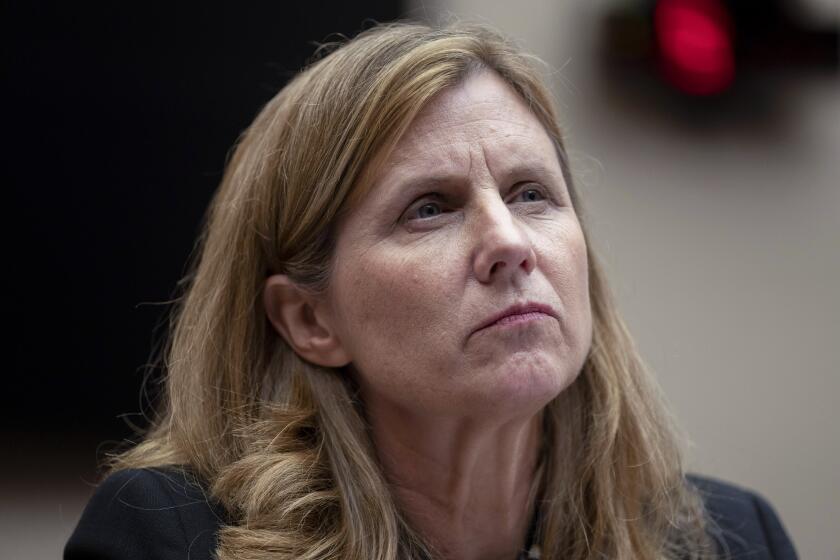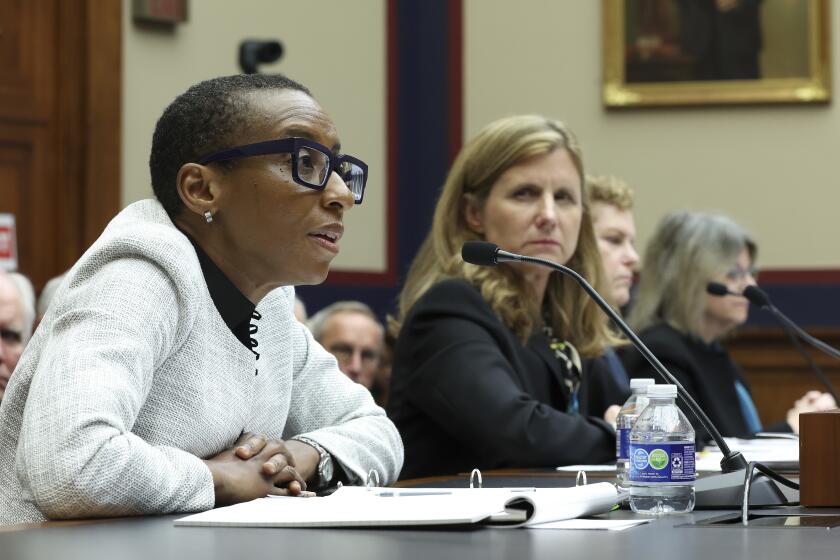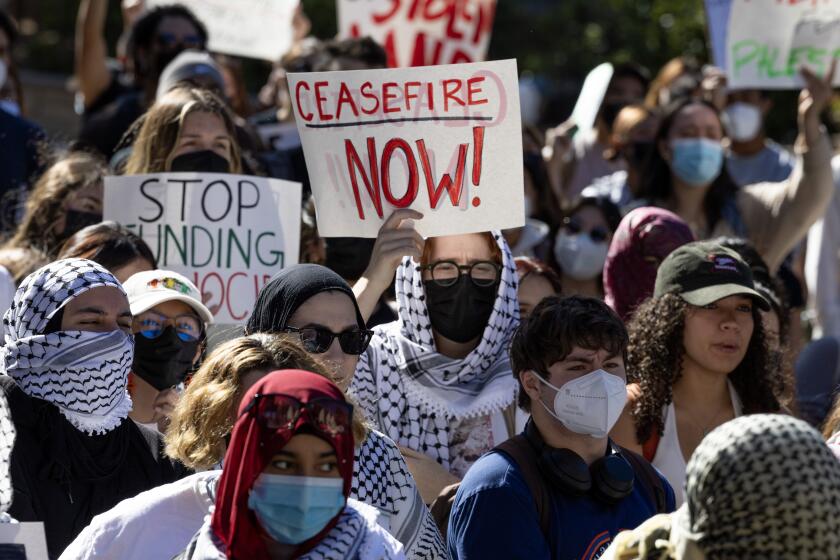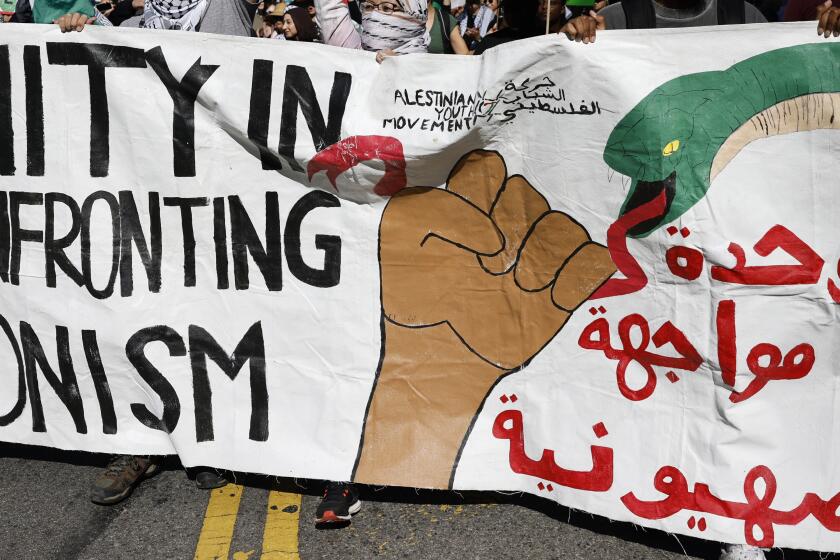Opinion: College presidents are supposed to be moral leaders, not evasive bureaucrats
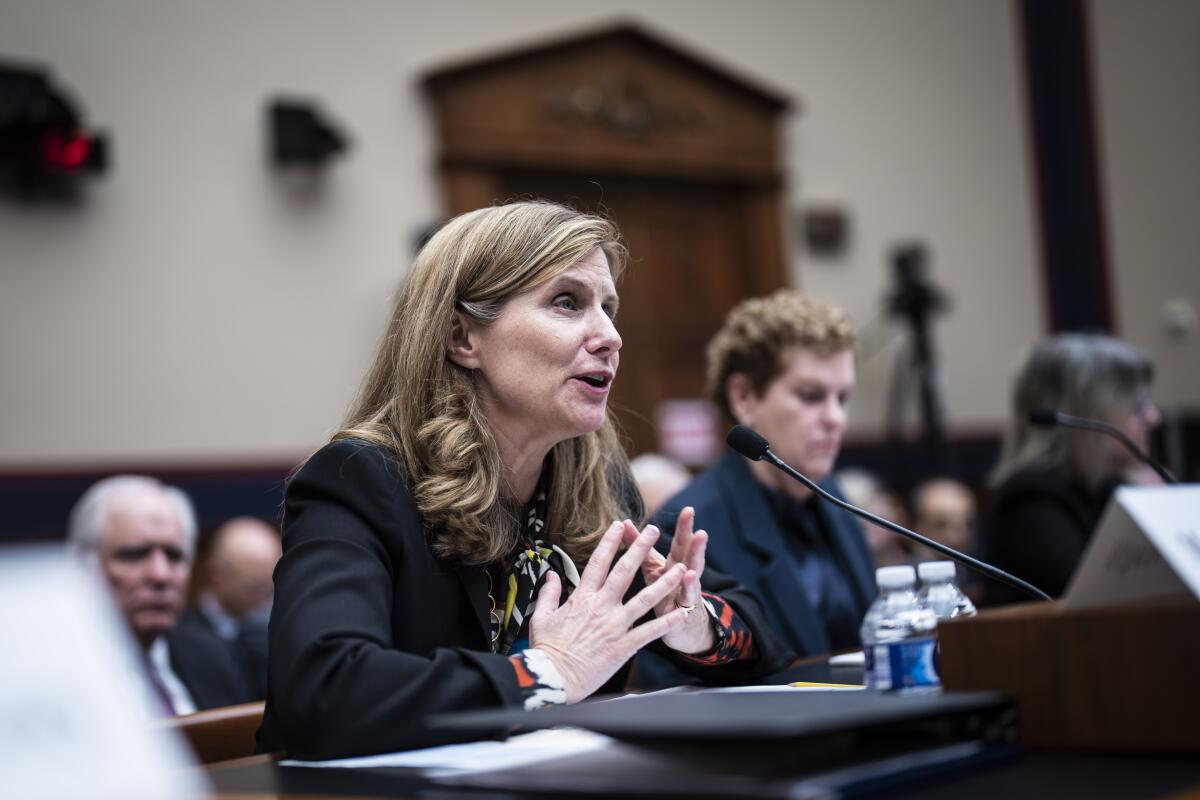
- Share via
Last week, the presidents of Harvard, the University of Pennsylvania and the Massachusetts Institute of Technology achieved in our nation’s capital what everyone thought was impossible: a bipartisan consensus! Unfortunately, that consensus was about the failure of those presidents to show moral clarity as they were questioned about what they would do when faced with direct expressions of antisemitism.
Their response, essentially “that depends,” failed the test of good sense and decency. The presidents were asked if they would stand up for their Jewish students and colleagues if groups on campus called for their annihilation. They wavered in the worst possible way, with evasive, legalistic responses that did not recognize the real fears that exist on campuses now. Their failure has had consequences. Liz Magill, president of Penn, has been forced to resign.
University of Pennsylvania president and board chair resign as antisemitism testimony draws backlash
University of Pennsylvania President Liz Magill has resigned amid pressure from donors and criticism over testimony at a congressional hearing.
As a university president, I understand their predicament as they tried to square lawyerly advice with what they must have known was the only answer that would be morally acceptable: Calls for genocide are repugnant and subject to university action. But I’m also a Jew, and I was appalled that they could not bring themselves to say that. Wouldn’t they have done so if other groups had been similarly threatened?
It was also outrageous that a MAGA culture warrior put them in this position, cornering them so easily. Rep. Elise Stefanik (R-N.Y.) is a proud pugilist for Donald Trump, eager to audition for what she hopes will be Trump’s next administration.
Her record is clear. Not only has she persisted in election denialism since 2020, she has encouraged replacement theory — the notion that elites (manipulated by Jews) are out to disempower and replace white Americans. Even after white nationalists have engaged in mass shootings, one case not far from her district in upstate New York, Stefanik has continued to fan the flames of white supremacy, eager to ride Trumpian coattails to spread this toxic message more widely.
Universities must keep students safe. But a broad new rule prohibiting ‘advocacy of genocide’ would not protect students and could be used against any group.
The fact that Stefanik could see the political advantage of baiting Ivy League presidents is no surprise. Stefanik is a Harvard graduate and knows the vulnerabilities of Ivy League administrators as well as anyone. At first, she asked if the familiar pro-Palestinian slogans would be considered hate speech at these universities. And then she asked about “intifada,” which most protesters understand as resistance (often violent) to endless (often-violent) Israeli military occupation. These would not be violations of the rules of any institution that claimed to value free speech, but then Stefanik took her kill shot. “Yes or no,” she asked: How about calling for the genocide of the Jews? The presidents didn’t see the trap until it was too late.
As far as I know, no one protesting on behalf of the Palestinian cause at their universities is calling for genocide — though many are accusing Israel of genocidal military tactics. A call for genocide would make it impossible for Jews to feel safe enough to continue to teach, learn or do research on their campuses. Some of the criticism of Israeli tactics has been offensive to many Jews, but here censorship is inappropriate.
I don’t like the ritual use of words like “genocidal” or “settler colonial,” nor do I want to hear the slogan “From the river to the sea, Palestine must be free,” but calls for freedom are not calls for murder. Protesters have the right to choose expressions that get under the skin of those with different perspectives. There is no right not to be offended. But anyone at a school calling for mass killing should be expelled because this call makes it impossible for the educational mission to continue.
I can be both broken-hearted over Israelis killed in the Hamas attacks and also grieve Palestinians killed in Israel’s retaliation.
Higher education leaders should not buy into an unregulated “market” approach to speech because educational environments depend on curated conversations. For years, many campuses have posted notices about “no hate zones” and have worked to mitigate the anxieties and bruised feelings of various groups who feel misunderstood or misidentified.
College presidents are not just neutral bureaucrats or referees among competing protesters, faculty and donors. We must not hide behind the language of lawyers. We must speak up on the issues of the day when they are relevant to the core mission of our institutions. Leaders of colleges and universities must not allow ourselves to be put on the defensive by politicians who are mostly interested in scoring points. We must defend academic freedom and intellectual diversity to ensure that demagogues don’t get to decide what we read or how we teach.
College officials may fear being perceived as taking sides in the Israel-Hamas conflict, but it is wrong to confuse condemning antisemitism with ignoring the plight of the Palestinians.
Our campuses should never be so protective that intellectual confrontation is off-limits, and they should foster forms of inclusion and respect that enable students to thrive — to be open to ideas and perspectives different from their own and from which they can learn. We can say “no” to calls for violence while cultivating the free speech essential for learning.
College presidents won’t keep our jobs by trying to protect people from controversies or from offensiveness. We do our jobs when we ensure that our campuses are safe enough spaces for the exploration of differences without fear of violence.
Michael S. Roth is the president of Wesleyan University and the author of “Safe Enough Spaces: A Pragmatist’s Approach to Inclusion, Free Speech, and Political Correctness on College Campuses” and “The Student: A Short History.”
More to Read
A cure for the common opinion
Get thought-provoking perspectives with our weekly newsletter.
You may occasionally receive promotional content from the Los Angeles Times.
